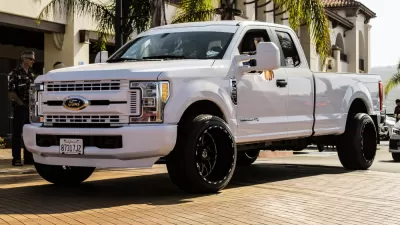Electric vehicles (EVs) have a bright future in the world's most populous nation and largest auto market, unlike those powered by oil. That was a ministry chief's message at an auto forum on Saturday.

China has yet to set a date for the ban, but it wanted to send a message to auto manufacturers that there's no future in sticking with petroleum-powered motor vehicles. China's plan would also ban the domestic production of oil-fueled vehicles.
"Xin Guobin, the vice minister of industry and information technology, said the government is working with other regulators on a timetable to end production and sales," reports Bloomberg News. "The move will have a profound impact on the environment and growth of China's auto industry, Xin said at an auto forum in Tianjin on [Sept. 9]."
A ban on combustion-engine vehicles will help push both local and global automakers to shift toward electric vehicles, a carrot-and-stick approach that could boost sales of energy-efficient cars and trucks and reduce air pollution while serving the strategic goal of cutting oil imports.
Cap-and-trade
Currently, China "offers generous subsidies to makers of new-energy vehicles. It also plans to require automakers to earn enough credits or buy them from competitors with a surplus under a new cap-and-trade program for fuel economy and emissions."
A report for Reuters indicates that the Chinese government is "studying" the ban, which would correspond with bans in several other countries (see below). China has already "set goals for electric and plug-in hybrid cars to make up at least a fifth of Chinese auto sales by 2025," write Tony Munroe and Yawen Chen.
Oil consumption increasing
In addition to reducing air pollution and carbon emissions, which China promised to cap by 2030 according to the Paris climate accord, the ban intends to curb rising oil consumption.
Last month, state oil major China National Petroleum Corp said China's energy demand will peak by 2040, later than the previous forecast of 2035, as transportation fuel consumption rises through the middle of the century.
International movement to ban ICEs
The international movement away from vehicles with international combustion engines has already been set in motion by Great Britain, France, India, Norway, Netherlands, and auto manufacturer Volvo, which was acquired in 2010 by Geely Holding Group, a Chinese multinational auto manufacturing company.
China is not only the world's largest auto market. It also accounts for 40 percent of global demand for electric and hybrid vehicles, according to Joe McDonald in a report on the proposed ban. In 2016, EV sales in China totaled 336,000, compared to 159,620 in the U.S.
Related in Planetizen:
- Are Reports Predicting a Future of Electric Vehicles Exaggerated? August 3, 2017
-
The Era of the Electric Vehicle is Approaching, July 17, 2017
Hat tip to Mark Boshnack.
FULL STORY: China to Ban Sale of Fossil Fuel Cars in Electric Vehicle Push

Maui's Vacation Rental Debate Turns Ugly
Verbal attacks, misinformation campaigns and fistfights plague a high-stakes debate to convert thousands of vacation rentals into long-term housing.

Planetizen Federal Action Tracker
A weekly monitor of how Trump’s orders and actions are impacting planners and planning in America.

San Francisco Suspends Traffic Calming Amidst Record Deaths
Citing “a challenging fiscal landscape,” the city will cease the program on the heels of 42 traffic deaths, including 24 pedestrians.

Defunct Pittsburgh Power Plant to Become Residential Tower
A decommissioned steam heat plant will be redeveloped into almost 100 affordable housing units.

Trump Prompts Restructuring of Transportation Research Board in “Unprecedented Overreach”
The TRB has eliminated more than half of its committees including those focused on climate, equity, and cities.

Amtrak Rolls Out New Orleans to Alabama “Mardi Gras” Train
The new service will operate morning and evening departures between Mobile and New Orleans.
Urban Design for Planners 1: Software Tools
This six-course series explores essential urban design concepts using open source software and equips planners with the tools they need to participate fully in the urban design process.
Planning for Universal Design
Learn the tools for implementing Universal Design in planning regulations.
Heyer Gruel & Associates PA
JM Goldson LLC
Custer County Colorado
City of Camden Redevelopment Agency
City of Astoria
Transportation Research & Education Center (TREC) at Portland State University
Jefferson Parish Government
Camden Redevelopment Agency
City of Claremont





























